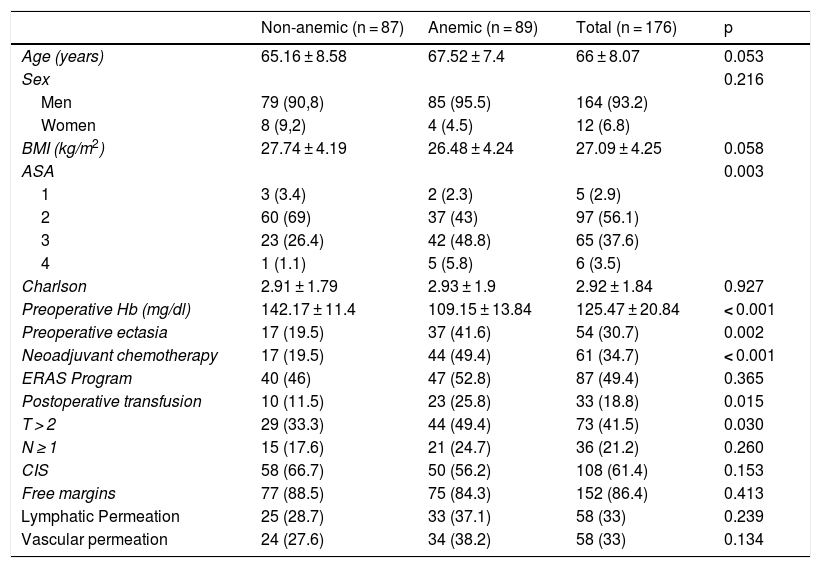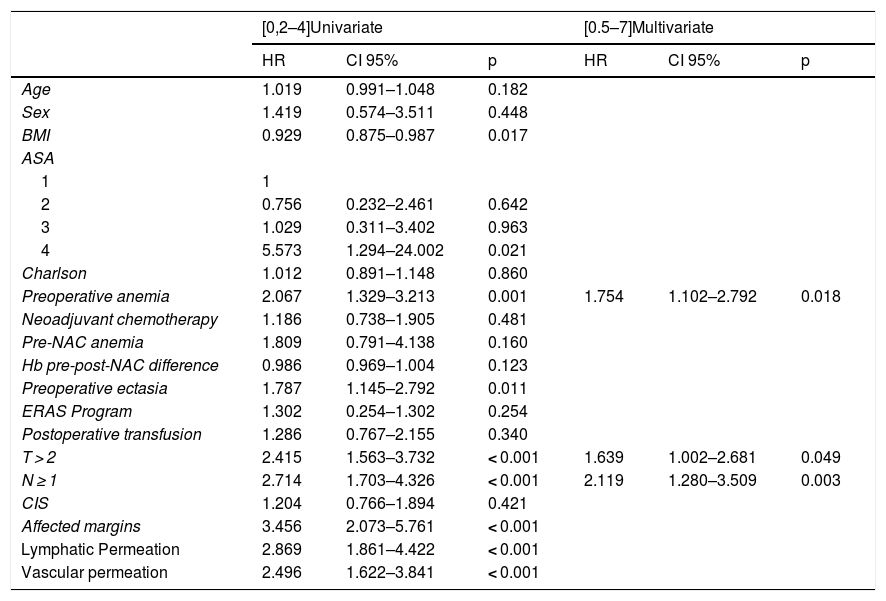To evaluate the prevalence of preoperative anemia and its effect on oncological outcomes in patients undergoing radical cystectomy (RC) due to bladder cancer.
Materials and methodRetrospective single-center study with 176 RCs between May 2008 and July 2018. Anemia was defined according to the WHO classification (male < 130 mg/dL, female < 120 mg/dL). Kaplan-Meier test was used to estimate recurrence-free, cancer-specific and overall survival rates. Multivariate logistic regression was used to identify factors associated with overall mortality rates.
ResultsOverall, 89 (50.6%) patients had preoperative anemia, and 44 of them (49.4%) received neoadjuvant chemotherapy. Anemic patients resulted in higher rates of ASA (ASA > 2: 54.6 vs. 27.5%; P = .003), ectasia rate previous to RC (41.6 vs. 19.5%; P = .002), treatment with neoadjuvant chemotherapy (49.4 vs. 19.5%; P < .001), blood transfusion rate (25.8 vs. 11.5%; P < .015) and pathological stage (pT < 2: 49.4 vs. 33.3%; P < .03) compared to non-anemic patients. Median follow-up was 27.2 months (IQR 11.12-72.28). Median overall survival (105 vs. 34 months, log-rank; P < .001), cancer-specific survival (89 vs. 61 months; P = .004) and recurrence-free survival (85 vs. 57 months; P = .002) were significantly lower in anemic patients compared to the non-anemic group. In multivariable Cox analysis, preoperative anemia, pT > 2 and N ≥ 1 were independently associated with overall mortality.
ConclusionPreoperative anemia was common in patients undergoing RC for bladder cancer, and it is related with a worse cancer prognosis. Anemia is a preoperative modifiable factor; we believe that the implementation of Patient Blood Management programs during prehabilitation may have a relevant role in improving the oncological outcomes in these patients.
Evaluar la prevalencia de anemia preoperatoria y su impacto sobre los resultados oncológicos de pacientes intervenidos de cistectomía radical (CR) por tumor vesical.
Material y métodosEstudio retrospectivo de 176 CR realizadas entre mayo de 2008 y julio de 2018 en un mismo centro. La anemia fue definida según los criterios de la OMS (hemoglobina < 130 mg/dl en hombres y < 120 mg/dl en mujeres). Mediante el método de Kaplan-Meier analizamos la supervivencia global, la supervivencia específica de cáncer y la supervivencia libre de recurrencia. Utilizamos la regresión logística multivariante para identificar los factores pronósticos de mortalidad global.
ResultadosDel total, 89 (50,6%) pacientes eran anémicos preoperatoriamente y 44 de ellos (49,4%) recibieron quimioterapia neoadyuvante. Los pacientes anémicos tuvieron un ASA mayor (ASA > 2: 54,6 vs. 27,5%, p = 0,003), más ectasia prequirúrgica (41,6 vs. 19,5%; p = 0,002), peor estadio patológico (pT > 2: 49,4 vs. 33,3%; p = 0,03), realizaron más quimioterapia neoadyuvante (49,4 vs. 19,5%; p < 0,001) y requirieron más transfusiones sanguíneas (25,8 vs. 11,5%; p = 0,015). La mediana de seguimiento fue de 27,2 meses (RIC 11,12-72,28). La supervivencia global (105 vs. 34 meses; p = 0,001), la supervivencia específica de cáncer (89 vs. 61 meses; p = 0,004) y la supervivencia libre de recurrencia (85 vs. 57 meses; p = 0,002) fueron peores en las CR anémicas. En el estudio multivariante, la anemia, un estadio pT > 2 y tener afectación ganglionar fueron identificados como factores predictores independientes de mortalidad.
ConclusiónLa anemia previa a CR es común y asocia un peor pronóstico oncológico. Siendo esta una variable modificable, la implementación de programas de Patient Blood Management durante la prehabilitación puede tener un papel importante para mejorar la supervivencia de estos pacientes.










